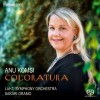| Country: | United States Of America |
| Period: | Avant-garde |
Biography
John Zorn (born September 2, 1953) is an American avant-garde composer, arranger, producer, saxophonist and multi-instrumentalist with hundreds of album credits as performer, composer, and producer across a variety of genres including jazz, rock, hardcore, classical, surf, metal, klezmer, soundtrack, ambient and improvised music.[1] He incorporates diverse styles in his compositions which he identifies as avant-garde or experimental.[2] Zorn was described by Down Beat as "one of our most important composers".[3]
Zorn established himself within the New York City downtown music movement in the mid-1970s performing with musicians across the sonic spectrum and developing experimental methods of composing new music.[2] After releasing albums on several independent US and European labels, Zorn signed with Elektra Nonesuch and received wide acclaim with the release of The Big Gundown, an album reworking the compositions of Ennio Morricone.[4] He attracted further attention worldwide with the release of Spillane in 1987, and Naked City in 1989.[2][5][6][7] After spending almost a decade travelling between Japan and the US he returned to New York as a permanent base and established his own record label Tzadik in the mid-1990s.[8][9][10]
Tzadik enabled Zorn to maintain independence from the mainstream music industry and ensured the continued availability of his growing catalog of recordings, allowing him to prolifically record and release new material, issuing several new albums each year, as well as promoting the work of many other musicians.[11] Zorn has led the hardcore bands Naked City and Painkiller, the klezmer/free jazz-influenced quartet Masada, composed over 600 tunes as part of the Masada Songbooks that have been performed by an array of groups, composed concert music for classical ensembles and orchestras, and produced music for opera, sound installations, film and documentary. Zorn has undertaken many tours of Europe, Asia, and the Middle East, often performing at festivals with many other musicians and ensembles that perform his diverse output.[12][13][14]
Zorn's compositions cross many genres and he has stated "All the various styles are organically connected to one another. I'm an additive person - the entire storehouse of my knowledge informs everything I do. People are so obsessed with the surface that they can't see the connections, but they are there."[15] For Zorn "Composing is more than just imagining music—it's knowing how to communicate it to musicians. And you don't give an improviser music that's completely written out, or ask a classical musician to improvise. I'm interested in speaking to musicians in their own languages, on their own terms, and in bringing out the best in what they do. To challenge them and excite them







